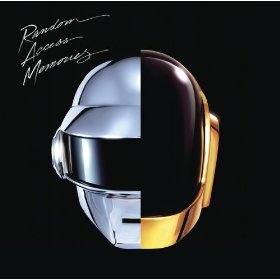Daft Punk: Random Access Memories
 Daft Punk
Daft Punk
Random Access Memories
(Columbia)
I was super psyched to get an advance copy of Daft Punk’s anticipated Random Access Memories, having streamed it incessantly at work for over a week. While hardcore fans seemed to worry that it didn’t sound enough like Daft Punk, to me, it’s the most progressive, sleek album I’ve heard from them since Homework…and a far more sophisticated effort at that.
Remember that LCD Soundsystem song about Daft Punk playing at MY house? Well this time, Daft Punk is throwing the party and everyone is playing at THEIR house…and it’s awesome! The album features a variety of talent, from legendary guitarist/producer Nile Rodgers of Chic and Sister Sledge to disco mastermind Giorgio Moroder and Animal Collective’s Panda Bear, as well as The Neptunes’ Pharrell Williams on the first single, the instant hit “Get Lucky,” a slick ode to the afterparty that I dare you to not dance to. It brilliantly encompasses three decades of dance music into one unforgettable collaboration, opening with “Give Life Back To Music,” a glitzy throwback that lands somewhere between disco and 80’s pop with a twist of early 90’s house and Nile Rodgers’ guitar thrown in, which was certainly enough to catch my attention.
The album is absolutely seamless, too; it flows right into the sensuous and mellow “The Game Of Love” and then to the one and only “Giorgio by Moroder,” an interview with the genius Giorgio where he waxes biographical over peppy beats with bubbling bass lines, morphing into intense synthpop. Another gem is “Lose Yourself To Dance,” which gives us both Nile Rodgers and Pharrell Williams on the same track. It’s almost too much, for one does get lost, especially with headphones on. Perhaps the most random contribution is that of Paul Williams, who sings (and wrote) “Touch,” a dreamy little ditty that explodes into a sort of gleeful synthpop-goes-Broadway.
At a certain point, you really just have to hear it for yourself. Daft Punk has truly outdone themselves and carved out a solid place in the history of electronic music. This album will age to perfection alongside Kraftwerk, The Bee Gees, and all other electronic music pioneers. As their peers struggle to keep their technology up-to-date, it seems inevitable that with this one, Daft Punk will keep us dancing.



